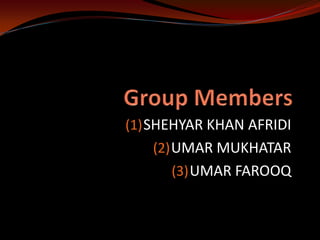
History of Computers from Abacus to Microchips
- 1. (1) SHEHYAR KHAN AFRIDI (2) UMAR MUKHATAR (3) UMAR FAROOQ
- 3. HISTORY OF COMPUTER In information society the focus of commerce is on the generation and distribution of information. Computer is changing the ways we communicate, do business and learn about the different branches of Education.
- 4. WHAT IS COMPUTER? The “Computer” is derived from the word “Compute", which means to calculate. so Computer is normally considered to be a calculating device. OR INPUT PROCESSING OUTPUT
- 5. USES OF COMPUTER We can store data in a computer and retrieve stored data when we needed. We can send message to our friends, relative and family anywhere in the world by connecting computer with internet. Medical sciences and Biotechnology are using computer to diagnoses the diseases of patient in hospital. For Entertainment purposes.
- 6. HISTORY OF COMPUTER ABACUS: PICTURE The earliest device that qualifies as a computer is the abacus. The abacus was invented 5,000 years ago in Asia Minor and still in use today .This device is allows users to calculate ,by sliding beads arranged a work.
- 7. HISTORY OF COMPUTER JOHN NAIPER(1550-1617) PICTURE John Napier was a Scottish mathematician .He made the first manual calculating device after Abacus .It was called John Napier bones or cardboard multiplication calculator. In addition to multiplication this machine was also used to calculate square roots and cube roots.
- 8. HISTORY OF COMPUTER BLAISE PASCAL(1623-1162) PICTURE In 1942 Blaise Pascal, The 18 year old son of French tax collector, invented a numerical wheel calculator to help his father in calculation. This device was known as “PASCALINE” and was only able to Add two numbers.
- 9. HISTORY OF COMPUTER BARRON GOTTFRIED(1646- 1716) PICTURE In 1694,a German philosopher and mathematician Barron gottfried wilhelm von jeibniz made some improvement in Pascal machine. He added features of multiplication and division. The machine was able to perform these operation by using repeated addition and subtraction.
- 10. HISTORY OF COMPUTER CHARLES XAVIER (1785-1870) PICTURE Charles Xavier Thomas De Colmar, a Frenchman, invented a machine in 1820 that could perform the four basic Arithmetic function. This machine was Arithmometer.
- 11. HISTORY OF COMPUTER CHARLES BABBAGE(1791-1871) PICTURE An English mathematician ,Professor Charles Babbage made a “Difference Engine” in 1833,which was powered by steam to solve mathematical equations. After ten years, in 1842 he made a general purpose computer named “Analytical Engine". this Engine could Add,subtracted,multiply and divide in automatic sequence at a rate of 60 addition per second.
- 12. HISTORY OF COMPUTER GEORGE BOOLE(1815-1864) PICTURE George Boole clarified the binary system of Algebra, that any mathematical equation could be stated either true of false.
- 13. HISTORY OF COMPUTER HERMAN HOLLERITH(1862- 1929) PICTURE In 1890, an American inventor Herman Hollerith applied the idea of punch boards in the form of for input and output. He a punched card tabulating machine.
- 15. GENERATION OF COMPUTER The steps of technological differences are called generations. In 1941 German engineers had developed a computer named Z3 to design airplanes and missiles. In 1943the British made a computer named Colossus to break secret codes during World War 2.
- 16. FIRST GENERATION OF COMPUTER First Generation of Computer were characterized by the fact that operating instructions were made-to-order for the specific task for which the computer was to be used. Each computer had a different binary coded program called machine language that told it how to operate.
- 17. THE DISTINCT FEATURES OF 1st G VACUUM TUBES: Vacuum tubes were the fragile glass devices that can control and amplify electronic signal. OPERATING INSTRUCTIONS: Operating instruction were used to operate computer for specific tasks. MACHINE LANGUAGE: Different Binary coded program for different comp
- 18. FIRST GENERATION OF COMPUTER ADVANTAGES DISADVANTAGES Vacuum tubes were the only First generation computer electronic component available were too large in size. during those days. Air Conditioning required. Vacuum tubes technology Non-portable made possible the advent of Produce large amount of heat that time. They could perform and burn out frequently. computation in millisecond.
- 19. SECOND GENERATION OF COMPUTER In 1948 with the invention of transistor, vacuum tubes replaced with transistors. As a result, the size of electronic machinery has been shrunk. 2nd generation computer replaced machine language to assembly language allowing abbreviated programming code to replace long difficult binary code
- 20. 2nd GENERATION OF COMPUTER ADVANTAGES DISADVANTAGES Smaller in size as compared to Air conditioning required. 1st Generation computer. Frequently maintenance Less heat generated. required. Better portability. Commercial production was difficult and costly.
- 21. THIRD GENERATION OF COMPUTER The invention of the silicon IC(Integrated circuit) by Robert Noyce in 1958 allowed dozens of transistor to be put on a single chip. This packaging made it possible to build computer that were smaller,faster,and cheaper than their transistorized predecessors. Another third generation development included the use of an operating system that allowed machines to run many different program at once with a central program that monitored and coordinated the computer memory.
- 22. 3rd GENERATION OF COMPUTER ADVANTAGES DISADVANTAGES Smaller in size as compared to Air conditioning required in previous generation many cases. computers. Highly difficult technology Working speed of these required for the manufacture computer is faster as compared of IC chips. to previous computers. Easily movable.